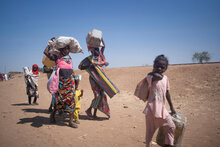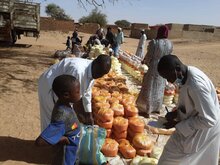Japan Helps Provide School Meals For 862,000 Children In Sudan
This new contribution of ¥390 million (US$3.2 million) will be used to provide some 862,000 school children across Sudan with nutritious meals for two months through WFP’s school feeding programme.
WFP runs school feeding programmes in food-insecure areas across Sudan. In 2015, more than 600,000 school children in the conflict-affected region of Darfur and another 261,000 in other parts of Sudan will benefit from the programme.
“I am pleased to announce this latest contribution from the people of Japan to the school feeding programme managed by WFP. It is my sincere hope to meet the dire needs of the Sudanese people as much as we can. I am particularly happy to direct our contribution this time to the children in hunger for food and education. No one denies the importance of children in making a better future. I hope that through the school feeding programme, more Sudanese children will go to schools and that their health will be improved,” said Japan’s Ambassador to Sudan, Hideki Ito.
In 2014, the Government of Japan contributed US$2 million for cash and commodity voucher programmes across the country. Additionally, Japan also contributed US$4 million to the United Nations Humanitarian Air Services (UNHAS) which is managed by WFP and provides safe and efficient air transport to the humanitarian community in Sudan.
“We are very grateful to the Government and people of Japan for this timely support for our school feeding programme which offers an incentive to families to send their children to school and for children to focus on learning and stay in school, and not drop out,” said WFP Country Director Adnan Khan.
Japan is among WFP’s most generous donors who continue to support operations over a long period, covering a range of programmes including school feeding and food for assets which provide people with food assistance in return for their work on community projects.
On 10 December 2014, WFP signed its first agreement with Rocinantes, a Japanese non-governmental organization, to carry out supplementary feeding in North Kordofan. The programme offers services including treatment of acute malnutrition among children aged under five and pregnant and nursing mothers, training of health workers and nutrition education for mothers.
This year is pivotal for WFP in Sudan. For the first half of 2015, WFP plans to assist 3.7 million people across Sudan – 2.7 million of them in the conflict-affected region of Darfur – through general food distributions, food for training, food for work, school feeding and nutrition programmes to prevent and treat moderate acute malnutrition among women and children. For the second half of the year, WFP will start focusing on activities to help affected communities rebuild and recover from the impact of conflict.
With a presence in Sudan since 1963, WFP has continued its complex and challenging activities over the past 12 years of conflict, providing food assistance to people suffering displacement and chronic under-nourishment in Darfur, in addition to supporting the most vulnerable living in the east and border areas to the south.
# # #
WFP is the world's largest humanitarian agency fighting hunger worldwide, delivering food assistance in emergencies and working with communities to improve nutrition and build resilience. Each year, WFP assists some 80 million people in around 75 countries.
Follow us on Twitter @wfp_media and @wfp_africa
For more information please contact (email address: firstname.lastname@wfp.org):
Amor Almagro, WFP/Khartoum, Tel. +249 183248001 (ext. 2114), Mob. +249 912174853
Abdulaziz Abdulmomin, WFP/Khartoum, Tel. +249 183248001 (ext. 2123), Mob. +249 912167055


